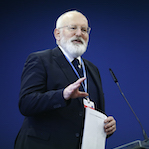
On the way to net zero: the make-or-break decade
This is make-or-break decade to tackle the climate and biodiversity crises. Both crises are already wreaking havoc across the European continent and around the world.
The storms, wildfires, and heatwaves battering our planet show that climate change is not a future threat. It is happening now. If we do nothing and we delay tough decisions, it becomes an existential threat.
The European Climate Law adopted this June has made the EU target of at least -55% reductions by 2030 legally binding. On the way to climate neutrality in 2050, we will need to accelerate our efforts to cut emissions across all economic sectors: energy, industry, transport, buildings, agriculture, forestry and more.
Delivering the Climate Law will require considerable effort in every Member State. It will not be easy, but it is possible.
The European Union is already proving that economic growth and emissions cuts can go hand-in-hand. Since 1990, the EU economy has grown over 60% while emissions have gone down more than 25%.
Europe’s existing legal framework thus offers a solid basis for our climate action. It would have brought us to over -40% in 2030, the EU’s original target. To get to -55% the Fit for 55 package proposed in July in large part strengthens our current rules.
It runs from scaling up renewable energy and more energy efficiency, to making our buildings, transport and industry more efficient and clean. We will put a price on carbon across the economy to turn the page on fossil fuels and restore our forests to help capture Co2 and support biodiversity.
Emissions trading takes a prominent position in these proposals. With its cap on emissions, the European Emissions Trading System is a proven and effective tool to bring down emissions. It prompts industry to switch to cleaner production, drives innovation, and generates revenues that become available for redistribution and reinvestment.
The package proposes a separate system for emissions trading in road transport and buildings. Emissions in these sectors have not decreased and our existing tools will not enable us to speed up emissions cuts fast enough.
Under the new system, fuel suppliers – not individual drivers, homeowners or tenants – will buy allowances to put fuel on the market. The cleaner their fuels, the less they pay. A quarter of the revenues from this system will go into a Social Climate Fund to compensate vulnerable groups in Europe for potential higher costs of heating and transport fuels, and help them invest in cleaner solutions. The fund would have € 72 billion available to provide temporary direct income support, and to help citizens finance zero-emission heating or cooling systems, or purchase a cleaner car.
Such action brings financial benefits too: a home that generates is own energy no longer has an energy bill to pay. And already now, driving an electric car costs less than a combustion engine. The problem is the upfront costs of the investment needed. The Social Climate Fund therefore helps citizens overcome the initial financial hurdle to a sustainable future.
All of the changes proposed under the Green Deal have clear long-term benefits: more space for nature, cleaner air, cooler and greener towns, healthier lives, and new economic opportunities.
The challenge at the heart of Europe’s green transition is how we bring these long-term benefits to all, as quickly and as fairly as possible. Because we want everyone to make it to the finish line in this race to zero.
The proposals in Fit for 55 bring real changes and provide crucial support to the most vulnerable in our societies. Down the road, their implementation may bring challenges. Overall, however, we must recognize Europe’s green transition as a massive opportunity. The Green Deal benefits the wellbeing of all of us, as well as those who come after us.
Our actions and ambition today are necessary to allow future generations – our children and grandchildren – to live happy, healthy lives on this planet. The Fit for 55 proposals, accompanied by equally ambitious global action in the next years, will make this possible. If we get to -55% in 2030, we are on our way to learning to live within planetary boundaries.
Europe can lead the way in the global race to net zero and simultaneously enjoy the advantages of being a first mover. The rest of the world is already watching us and looking how they too could turn around their economy and society.
If we act now and have the courage to tell people honestly what is needed to save humanity and save our planet, and if we show it is done fairly, I’m convinced that can make some very fundamental changes. These will be changes to inspire the whole world and prompt leaders across the globe to come up with a plan of their own. It is what is necessary in this make-or-break decade.
Moving forward, we have to remember that the world is changing rapidly whether we move or not. If we want to be masters of our fate, the Green Deal is our roadmap to a green, clean, and healthy future.




